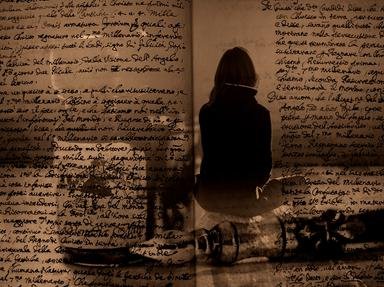Quiz Answer Key and Fun Facts
1. In 1914, this dazzling schoolmaster and poet was born in Wales. He sustained a stormy and drunken relationship with his wife Caitlin until he died of pneumonia in 1953, exacerbated by the dying light of New York City smog. Who wrote many of his best poems before he was twenty?
2. Born in 1932, this Fulbright scholar published her first poem at eight, was strongly influenced by Anne Sexton, and died by her own hand in 1963. Who wrote, "If I've killed one man, I've killed two/The vampire who said he was you/And drank my blood for a year/Seven years, if you want to know..."?
3. This poet was born in St. Louis, Missouri in 1888. He later became a British subject. He believed the poet's personal life should be invisible and anonymous. To honor this Nobel Prize winner, called the poet of the century, let's forgo questions about his marriage, sexuality, or racial remarks. Who gave us, "The Waste Land"?
4. This king of the beatniks believed he was visited by the spirit of William Blake. He was deported from Prague and he dropped out of Columbia University. He spent his life touring, stunning audiences with his poetry readings. Who was howling on the road?
5. This medical doctor was friend and tutor to many. He believed in a new, fresh, American language, rooted in direct observation and local idiom. He wrote: "...unsignificantly/off the coast/there was/a splash quite unnoticed/this was/Icarus drowning." Which poet depended upon a red wheelbarrow?
6. His father was an English coal miner, and this poet was diagnosed with a lung infection as a boy that caused his death in 1930. Yet he loved, he risked, he traveled widely, and he strove to achieve a living spirit in his poetry. Which great modern poet is better known for his banned and burned novels?
7. This favored American poet read little before he was 12, yet he was class poet by the end of high school. He tried many jobs and two colleges before setting his own course as a poet. He wrote: "Two roads diverged in a yellow wood/And sorry I could not travel both..." Who took the road not, in truth, less traveled?
8. In 1951, at just 22, she graduated from Harvard, then wrote two books of poems, earned a Guggenheim Fellowship, married, and had three kids. In the 1960s she moved into political, civil rights and controversial poetry. She wrote: "I came to explore the wreck/The words are purposes/The words are maps..." Which feminist poet went diving into the wreck?
9. Just twenty and already celebrated, she moved to Greenwich Village in 1917 where she was an actress, playwright, satirist, wife, and poet. She wrote eloquently and perhaps traditionally about love, nature, public events and anti-fascism. She wrote: "Monstrous and beautiful to human eyes, hard to believe...". Which of these women won the Pulitzer Prize for poetry?
10. This beloved author and poet was born in Bombay in 1865. He traveled widely, and declined many honors. He is well known for poetry supporting war, but after his young son Jack was killed in WWI, the poet wrote famously about its costs: "If any question why we died/ Tell them, because our fathers lied...". If you can keep your head about you, who is this poet?
Source: Author
Godwit
This quiz was reviewed by FunTrivia editor
Snowman before going online.
Any errors found in FunTrivia content are routinely corrected through our feedback system.
